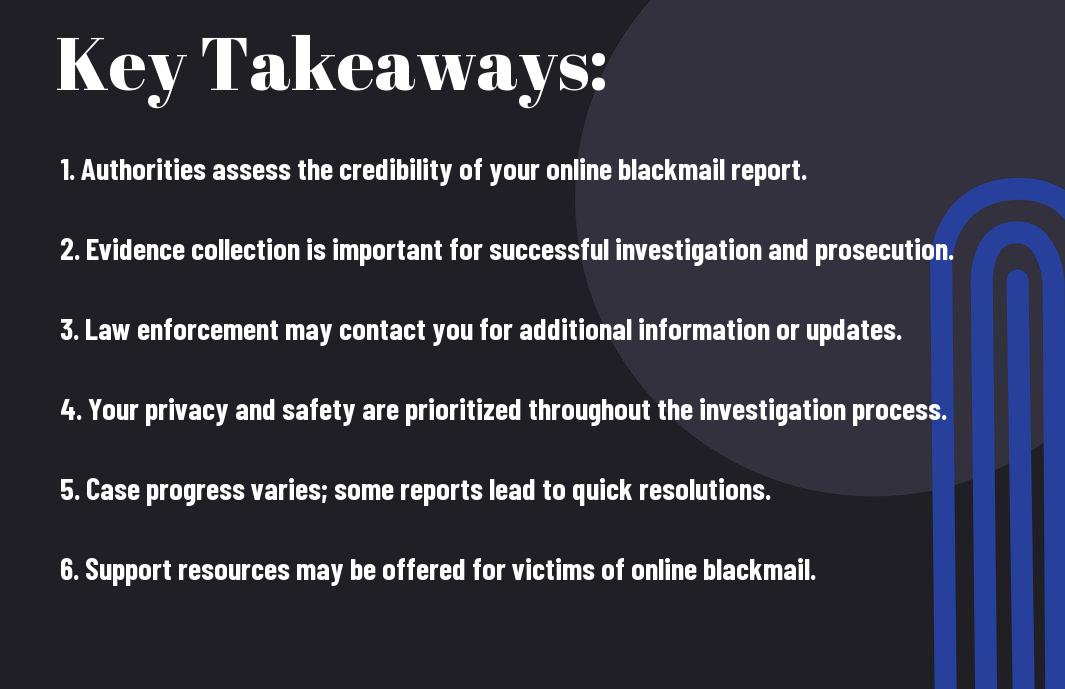Online blackmail can be a terrifying experience, leaving you feeling helpless and vulnerable. Once you choose to file a report, it initiates a series of actions aimed at protecting you and pursuing the criminal. You will likely receive guidance on documenting evidence and may be prompted to take precautions to secure your online presence. Authorities may also conduct investigations, which could lead to legal consequences for the perpetrator. Understanding this process is necessary to empowering yourself and reclaiming control over your situation. Contact Digital Forensic Squad for assistance to report online blackmail.
Key Takeaways:
- Filing a report initiates an investigation by relevant authorities, which may include local police or cybercrime units.
- After reporting, it’s important to preserve all evidence, such as screenshots and communications, to assist law enforcement in their investigation.
- Victims may experience varying responses from law enforcement, and it is advisable to seek support from professionals or organizations that specialize in cybercrime for additional guidance.
Understanding Online Blackmail
While online blackmail can happen to anyone, it often thrives in the shadows of anonymity provided by the internet. This form of extortion typically involves threats to release personal or sensitive information unless a payment or other demands are fulfilled. Being aware of the nature of online blackmail can empower you to take action and protect yourself.
Definition of Online Blackmail
Between various online platforms and personal interactions, online blackmail refers to the act of coercing someone through threats, usually to release damaging material or personal information against their will. It can manifest in different ways, but the core concept remains the same: using fear to achieve control over your actions.
Common Tactics Used by Blackmailers
Between manipulation and intimidation, blackmailers deploy a range of tactics that exploit your vulnerabilities. They often threaten to share intimate images, personal financial information, or fabricated stories that could harm your reputation. Each tactic is designed to create a sense of urgency and desperation, compelling you to comply with their demands.
Further, blackmailers may use social engineering techniques to gather information about you, making their threats seem more credible. They can use fake identities or impersonate individuals you trust to instill a sense of fear. It’s imperative to stay vigilant and realize that responding to their demands can often lead to further manipulation, rather than resolution, as they may increase their demands or threats as a result.

Reporting Online Blackmail
Any form of online blackmail is a serious issue, and it’s imperative that you take immediate action by reporting it to the appropriate authorities. Reporting helps protect not only yourself but also potential future victims. Platforms where the harassment occurs often have specific procedures in place, and knowing how to navigate them is vital for getting the help you need.
How to File a Report
Among the first steps you should take is to identify the platform where the blackmail is occurring. Most social media sites, email providers, and online forums have a reporting mechanism. Look for options labeled “Report Abuse” or “Report a Problem,” and provide as much detail as possible.
Information Needed for Your Report
The details you include in your report can significantly impact the outcome. Make sure to gather evidence such as screenshots of the conversations, any relevant email addresses, and timestamps of when the incidents occurred.
Hence, when filing your report, be sure to provide comprehensive documentation, including screenshots, usernames, and any personal communication related to the blackmail. This information will assist authorities in investigating your case more effectively. Additionally, detailing your emotional state and the impact of the blackmail can also help illustrate the severity of the situation and your need for intervention.

What to Expect After Filing a Report
All reports of online blackmail are taken seriously, and after you file, expect a structured response from the authorities. You may receive a confirmation of your report, and it’s common for law enforcement to contact you for more details. They will guide you on the next steps to ensure your safety and potentially investigate the situation further.
Law Enforcement Follow-Up
What you can anticipate is a follow-up from law enforcement to discuss the details of your case. They may ask for additional evidence or details regarding the blackmail situation. Cooperation with their inquiries is key, as it aids in building a strong case against the perpetrator.
Potential Outcomes of the Report
Report filed may lead to a variety of outcomes depending on the evidence and circumstances.
In addition to potential criminal action against the blackmailer, you may receive guidance on how to protect yourself moving forward. Law enforcement might conduct investigations that can lead to arrests, but outcomes can vary widely. If they cannot proceed criminally, you may still have options such as reporting the individual to their online platform or seeking legal advice. It’s important to stay updated with law enforcement and consider protective measures to safeguard your personal information.
Protecting Yourself Before and After Reporting
To safeguard your personal information and mental well-being during the online blackmail process, take proactive measures both before and after filing your report. Ensure you strengthen your online privacy settings, change your passwords regularly, and avoid sharing sensitive information on public platforms. Additionally, consider speaking to trusted friends or professionals about your experience to alleviate the emotional impact.
Preventive Measures
On a practical level, employ strong, unique passwords for each of your online accounts and utilize two-factor authentication wherever possible. Regularly monitor your digital footprint, and promptly adjust privacy settings on social media and other online platforms. Educate yourself about phishing tactics and be vigilant against suspicious communications to minimize risks.
Steps to Take After Reporting
At this point, focus on your online security and mental health. Keep any documentation related to the blackmail for future reference and consider reaching out to local authorities for further support. Continue monitoring your accounts for unusual activity and stay informed about your rights in these situations.
With the reporting process underway, it is imperative to follow up on your case to ensure it is being handled. Stay engaged with your local authorities and offer them any new information that may arise. Consider consulting with professionals who specialize in online harassment, as they can offer valuable guidance during this challenging time. Your well-being should be your top priority, so don’t hesitate to reach out for support from friends, family, or mental health professionals if you feel overwhelmed. Being proactive after reporting empowers you to regain control over your situation.
Resources for Victims of Online Blackmail
Not all hope is lost if you find yourself a victim of online blackmail. Various resources are available to help you navigate this challenging situation. From emotional support to legal advice, you can access the right tools to regain control and protect your interests.
Support Services
Across different platforms and organizations, you will find support services specifically designed for victims of online blackmail. These services offer emotional support, confidential counseling, and peer support groups, allowing you to share your experiences and seek guidance from those who understand your plight.
Legal Assistance
Services providing legal assistance can greatly benefit you in your fight against online blackmail. They help you understand your legal rights and options, and can guide you through the process of reporting the crime and taking further action.
Assistance from legal professionals ensures you are equipped with the knowledge needed to confront online blackmail effectively. These experts can help you determine if you have grounds for legal action, such as filing a lawsuit or seeking protective measures. They also provide advice on communicating with law enforcement and managing evidence collection, which can be vital during investigations. Engaging with legal services allows you to address the situation confidently and advocate for your rights in a potentially life-altering circumstance.
Ethical and Legal Implications of Online Blackmail
After experiencing online blackmail, it is important to understand the serious ethical and legal implications involved. Engaging in blackmail not only harms your well-being but can also lead to severe repercussions for the perpetrator, including criminal charges. By reporting the crime, you contribute to a larger effort to combat this type of behavior, ensuring that both victims and offenders are recognized under the law.
Understanding Online Laws
On the internet, laws vary considerably by location, but many places recognize online blackmail as a punishable offense. Whether through federal, state, or local statutes, you may find that your situation falls under specific legislation aimed at protecting individuals from harassment, extortion, and other cyber crimes. It is imperative to familiarize yourself with these laws to understand your rights.
The Role of Social Media Platforms
After you report online blackmail, social media platforms have a responsibility to investigate the situation. These platforms often have strict guidelines and policies against harassment to maintain a safe community. Your report can initiate the process of identifying the perpetrator and potentially removing harmful content.
In fact, social media platforms play a critical role in combating online blackmail. When you report an incident, these companies can take immediate action to protect your account and prevent further abuse. They may also collaborate with law enforcement if necessary, providing them with relevant information to address the situation. However, it is important to note that their investigations can vary in thoroughness and speed, depending on their resources and policies.
To wrap up
On the whole, reporting online blackmail is a vital step towards regaining control and ensuring your safety. After you file a report, law enforcement and support organizations may take action to investigate your case and provide guidance. It’s important to remain proactive and informed throughout the process. Staying aware of options available to you can help alleviate the stress of the situation. FAQ
Q: What can I expect after filing a report regarding online blackmail?
A: Once you file a report, you can expect a multi-step process from law enforcement or relevant agencies. First, they will review your report and the evidence you provided. Depending on the severity and nature of the case, they may initiate an investigation. You might receive updates on the progress of the investigation, but timelines can vary. Additionally, law enforcement may provide you with resources or support options to help you cope with the emotional impacts of the blackmail. Keep in mind that while they strive to address these situations, the outcome may take time, and not all cases result in arrests or resolutions.
Q: Will reporting online blackmail publicly expose my situation?
A: Reporting online blackmail does not automatically make your situation public. Law enforcement and reporting agencies typically handle cases confidentially to protect the victim’s identity and personal information. However, if your case escalates to legal proceedings or if you decide to pursue a civil action, there could be situations where details may become public. If privacy is a major concern for you, discuss it with the authorities or legal counsel while filing your report to understand what measures can be taken to preserve your confidentiality.
Resources:
1. report internet blackmail: The clear and best way to get ….


